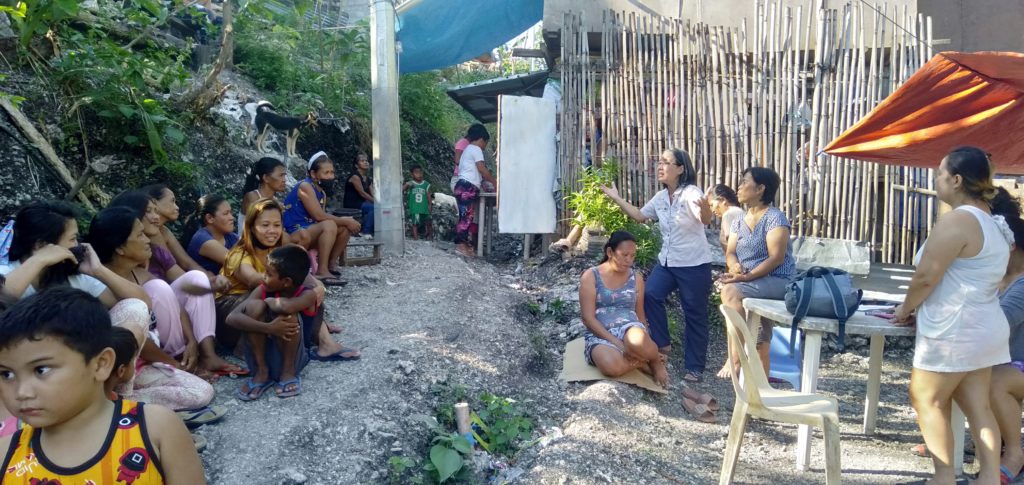Psychosocial support services were recently rendered to more than 500 residents of four barangays in north Cebu that were devastated by Typhoon Yolanda. Trainings for community health workers were also conducted.
The services were rendered by the Visayas Primary Health Care Services in Barangays Tindog and Dalingding Sur, Medellin, and Barangays Paypay and Dalingding Norte, Daanbantayan.
The program is part of a 15-month project, “Community – Led Disaster Preparedness and Resiliency: Grassroots’ Alternative in the Face of Climate Change,” which is implemented in the four barangays by the Women’s Resource Center of the Visayas (WRCV) based in Cebu City. The project proponent is the Philippine Network of Food Security Programmes, Inc. (PNFSP). It is funded by the Terre des Hommes International Federation (TDH).
The project aims to ensure that the four barangays have fully recovered from the main impacts of the typhoon, restored their livelihood and established safety and disaster prevention, response and recovery mechanisms and achieved their basic rights to food for their children and families through livelihood assistance and food security alternatives.
As part of the rehabilitation process, the VPHCS conducted a series of psychosocial sessions in October for more than 500 adults and children who were affected by Typhoon Yolanda. Teams of nurses, psychologists and trained health care givers conducted in-depth stress debriefing sessions and trauma healing to small groups of residents. During the sessions, the residents who were all survivors of Typhoon Yolanda ventilated and shared their experiences on Yolanda which were then processed by the psychosocial team so that they were relieved of their fears and stress and resolved to face future life’s challenges.
Children and the youth also had play and art therapy to express their feelings and experiences during the typhoon.
Trainings for 22 community health workers were also conducted.
During the first training on “Health disaster preparedness and mental health orientation” on Oct. 25-26, the CHWs were able to understand disaster risk reduction and preparedness and management. Disaster mapping of their particular barangays was also done in order to pinpoint the specific disasters, particularly typhoons, that they are vulnerable to and how to address them. The CHWs were also taught the health measures related with disaster preparedness and management.
Furthermore, the CHWs were taught the basic elements of mental health problems resulting from disasters as exemplified by Typhoon Yolanda and how to deal with people with such problems, particularly how to do simple stress debriefing. After the training, the CHWs were thankful of the knowledge and skills that they learned that will enable them to help their community members.
The second training, “Local health workers training on facilitation using the tool of psychological processing,” was conducted on November 15-16. The 22 CHWs were taught about Community Resiliency Model (CRM), a type of simple wellness, teaching, learning and communication skills that can be used to treat persons experiencing stress or psychological trauma. Through discussions, exercises workshops and practicum, the CHWs were taught how to handle persons in times of stress including the psychological effects of disasters.
With the trainings on psychosocial processing facilitation, the CHWs will be equipped to facilitate simple psycho-social processing for adults and children and undertake community activities on health disaster preparedness, especially on awareness -raising on the health effects of disasters and activities to build individual and collective coping strategies.
The participants were thankful for the new skills they learned which they can use to help and teach others, facilitate the resolution of simple problems, help families, as well as refer persons who may need special psychosocial counseling and treatment to psychiatrists and psychologists.
The CHWs were all members of the people’s organizations which were organized by the WRCV as an offshoot of the relief efforts immediately after the typhoon.



